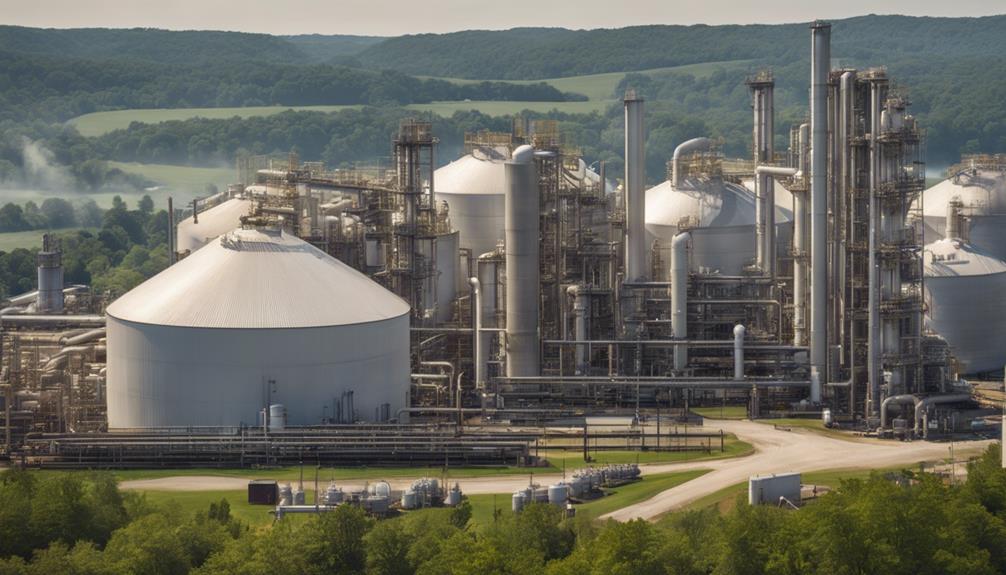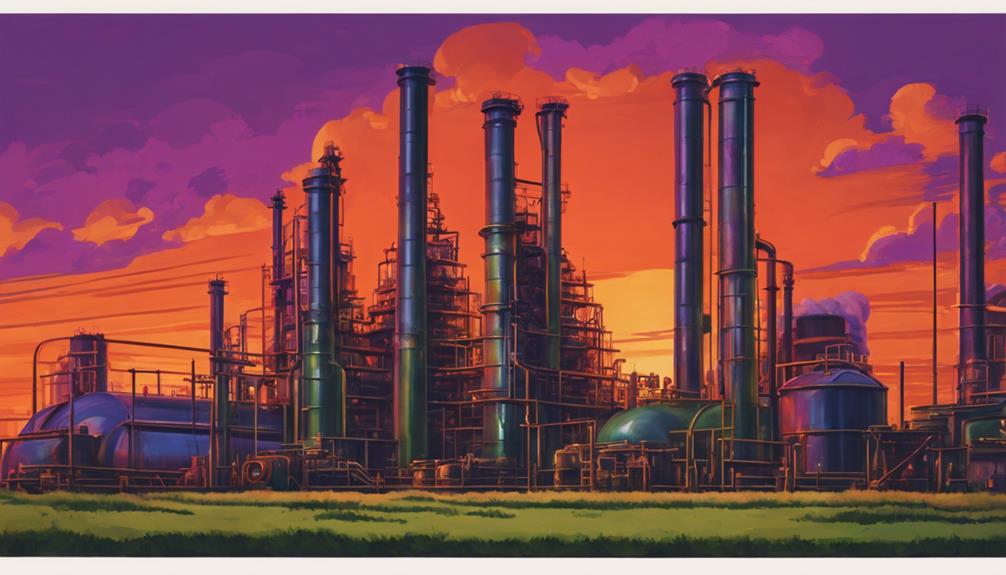When you consider the Virginia Fuels Tax-Refiner Bond, it's clear that this requirement plays a pivotal role in the state's fuel industry. It's not just about compliance; it's a strategic move that can influence your operations and reputation. As you navigate the complexities of bond amounts and eligibility criteria, you might wonder how these factors affect your bottom line. The implications extend beyond just regulatory adherence—there are broader impacts on fuel prices and market stability that could shape the future of your business. What challenges and opportunities lie ahead?
Overview of Fuels Tax-Refiner Bond

When it comes to the Virginia fuels tax, understanding the refiner bond is crucial for compliance and financial planning. This bond acts as a safeguard, ensuring that refiners adhere to their tax obligations. Essentially, it's a financial guarantee that the state can collect taxes owed on fuels produced or imported into Virginia.
As a refiner, you're required to secure this bond before you can start operations. The amount of the bond is typically based on your estimated tax liability, and it can vary depending on your production levels and the types of fuels you handle. By having this bond in place, you show that you're committed to fulfilling your tax responsibilities.
If you fail to maintain the bond, you could face penalties, including fines or a suspension of your operations. It's important to keep track of your bond status and renew it as necessary.
You'll want to consult with a tax professional or legal advisor to ensure you're meeting all requirements. This proactive approach helps you avoid costly mistakes and keeps your operations running smoothly. Understanding the refiner bond is an essential step in navigating the complexities of the Virginia fuels tax system.
Importance of the Bond
The bond isn't just a formality; it's a critical component of your operations as a refiner in Virginia. Essentially, it serves as a financial safety net, ensuring that you meet your tax obligations. When you hold this bond, you're demonstrating your commitment to compliance, which can enhance your reputation with regulators and partners alike.
By securing this bond, you're also protecting yourself against potential liabilities. If you fail to pay the required fuels tax, the bond provides a way for the state to recover those funds without further penalizing your business. This safety mechanism can prevent significant financial strain and help maintain smooth operations.
Moreover, having this bond in place can make it easier for you to secure contracts and build relationships within the industry. Many stakeholders prefer to work with refineries that show they're financially stable and responsible.
In short, the bond is more than just a legal requirement; it's a strategic asset that can bolster your business's credibility and financial health.
Don't overlook its importance as you navigate the complexities of operating in the fuels market in Virginia.
Eligibility Criteria for Refiners

To qualify as a refiner in Virginia, you must meet specific eligibility criteria that ensure your operations align with state regulations. First, you need to hold a valid refiner's license issued by the Virginia Department of Taxation. This license confirms that you comply with all necessary state laws and industry standards.
Additionally, it's important to understand that fuel tax bonds are crucial for demonstrating your commitment to meeting tax obligations.
Next, you must demonstrate that you have the proper facilities to refine fuels. Your operations should include equipment and processes that meet safety and environmental regulations. This means adhering to local zoning laws and obtaining any required permits for your refining activities.
Additionally, you'll need to maintain accurate records of your production and sales. These records must be available for inspection by state authorities to ensure transparency in your operations.
Lastly, financial stability is crucial. You may be required to provide proof of financial capability, including an appropriate bond amount, to cover potential taxes owed to the state.
Meeting these eligibility criteria not only helps you operate legally but also establishes your credibility in the fuel industry.
Application Process
After ensuring you meet the eligibility criteria as a refiner, the next step is to navigate the application process for your refiner's license in Virginia.
You'll need to gather all required documentation, including proof of your business structure, tax identification numbers, and any relevant permits. Make sure your application form is complete and accurate to avoid unnecessary delays.
Once you've compiled everything, submit your application to the Virginia Department of Taxation. It's wise to double-check that you're submitting it to the correct department and that you've included any necessary fees.
Keep in mind that processing times can vary, so be patient as you wait for a response. If the department requests additional information or clarification, respond promptly to keep the process moving.
Once your application is approved, you'll receive your refiner's license, allowing you to conduct business legally in Virginia.
Make sure to maintain records of your application and any correspondence with the department. This will help you stay organized and prepared for any future inquiries or renewals.
Following these steps diligently can help ensure a smooth application process for your refiner's license.
Bond Amount and Duration

When applying for a refiner's license in Virginia, you'll need to understand the bond amount and duration requirements set by the state. Specifically, Virginia mandates that refiners post a bond as a form of financial assurance.
The bond amount typically corresponds to your estimated annual fuel tax liability, which means you'll want to calculate that accurately to avoid underestimating or overestimating. The minimum bond amount is often set at $10,000, but depending on your expected fuel sales and tax obligations, you may need to post a higher bond.
It's crucial to assess your operations thoroughly to determine the appropriate figure. As for the duration, the bond usually remains in effect as long as you hold your refiner's license.
If you decide to discontinue operations or your license is revoked, you'll need to cancel the bond, but ensure all tax obligations are settled first. Keeping these factors in mind will help you navigate the bonding process more smoothly and ensure compliance with Virginia's regulations.
This proactive approach can save you from potential issues down the line.
Compliance Requirements
Understanding compliance requirements is essential for any refiner operating in Virginia. You must adhere to specific guidelines set by the state to maintain your operational license and ensure compliance with the Virginia Fuels Tax regulations.
First, you'll need to register with the Virginia Department of Taxation and obtain a fuels tax registration certificate. This step is crucial to ensure your business is recognized within the state's tax framework.
Next, you'll have to maintain accurate records of all fuel purchases and sales, including invoices and receipts. These records should be available for review upon request from state officials.
Additionally, you'll need to file periodic tax returns, detailing your fuel sales and the taxes collected. This typically happens on a monthly or quarterly basis.
It's also vital to stay updated on any changes to state laws or regulations regarding fuels tax, as these can impact your compliance obligations.
Lastly, ensure that your bond amount is adequate and in place, as this is a critical component of the compliance process.
Consequences of Non-Compliance

Non-compliance with Virginia Fuels Tax regulations can lead to serious consequences for your business. You might face hefty fines and penalties that can quickly add up, affecting your bottom line. The state takes these violations seriously, and if you're found to be non-compliant, the repercussions can include legal action against you or your company.
Additionally, failure to comply with tax regulations may also jeopardize your ability to obtain necessary Cigarette tax bonds, which act as a financial guarantee required for legal operation in certain industries.
Furthermore, your ability to conduct business could be compromised. You may encounter delays in receiving necessary permits or licenses, hindering your operations and growth. If your business relies on maintaining a good reputation, non-compliance can damage your credibility in the industry, making it harder for you to secure partnerships or contracts in the future.
Moreover, you might be subjected to increased scrutiny from regulatory agencies. This could result in more frequent audits and inspections, leading to a drain on your resources.
To avoid these consequences, it's crucial to stay informed about the regulations and ensure your operations align with them. Proactively managing your compliance can save you from the headaches associated with non-compliance, ultimately allowing you to focus on growing your business.
Impact on Fuel Prices
Changes in Virginia Fuels Tax regulations can significantly impact fuel prices across the state. When the state adjusts tax rates, it directly influences the cost structure of fuel suppliers. If taxes increase, suppliers often pass these costs onto consumers, leading to higher prices at the pump. Conversely, a tax decrease could provide temporary relief, lowering prices for drivers.
Moreover, the bond requirements for refiners can also play a role in pricing. If refiners face stricter obligations, their operational costs may rise, which could result in elevated fuel prices. You might notice fluctuations depending on how refiners respond to these regulations, affecting your monthly budget.
It's essential to understand that fuel prices aren't solely based on local taxes. Global oil prices, seasonal demand, and local market competition also contribute significantly.
However, state tax policies can create a ripple effect that ultimately reaches you as a consumer.
Future of the Fuels Tax-Refiner Bond

As fuel prices fluctuate due to various factors, the future of the fuels tax-refiner bond will play a pivotal role in shaping the market landscape. You need to understand how changes in tax policies and refining regulations could impact this bond's stability and effectiveness.
If the state adjusts tax rates or enhances compliance measures, refiners might face increased operational costs, which could, in turn, affect fuel prices at the pump.
Moreover, as environmental concerns grow, you'll see a push for cleaner fuel options. This shift might require refiners to invest in new technologies, potentially altering the dynamics of the fuels tax-refiner bond.
If refiners can adapt and innovate, you might witness a more resilient bond that supports sustainable practices.
On the other hand, any economic downturn could challenge refiners' financial health, placing pressure on the bond's effectiveness.
It's crucial to monitor these trends closely. By staying informed, you can better anticipate how the fuels tax-refiner bond will evolve and what that means for fuel prices and availability in the near future.
Your awareness will empower you to make informed decisions in this ever-changing market.
Conclusion
In conclusion, the Virginia Fuels Tax-Refiner Bond is essential for ensuring compliance with tax obligations and maintaining a stable business environment for refiners. By understanding its importance and fulfilling eligibility criteria, you can navigate the application process smoothly. Staying compliant not only safeguards your operations but also enhances your credibility in the industry. As regulations evolve, keeping up with the bond's requirements will be crucial for your success and the overall stability of fuel prices in Virginia.

